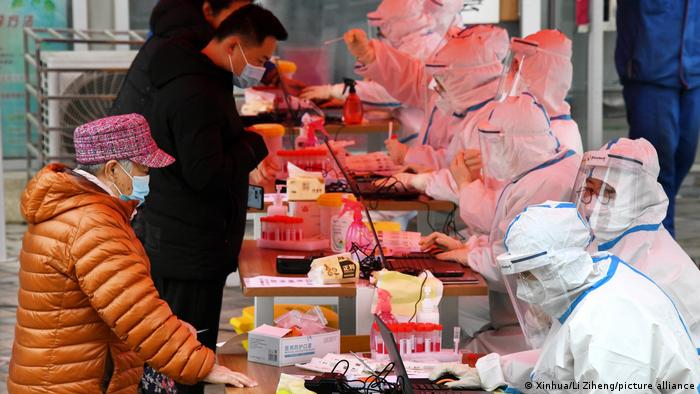The Chinese city of Shenzhen, a city of 17 million, experienced its first full day under lockdown on Monday until March 20 following outbreaks of the highly transmissible omicron variant sweeping across the nation.
China has recorded more COVID-19 cases in 2022 than in the whole of 2021, official figures show. Mainland China reported 1,337 new domestically transmitted COVID-19 cases with confirmed symptoms on Sunday, the National Health Commission (NHC) said on Monday.
This brings the total this year to more than 9,000, compared with 8,378 in 2021, according to calculations by Reuters news agency.
Shenzhen, known as China's Silicon Valley, has now temporarily suspended public transport and urged people to stay at home as authorities carry out mass testing across the city this week after a surge in local COVID-19 cases.
Key Apple suppliers, Foxconn and Unimicron Technology Corp, have both temporarily halted their operations in China's tech city until further notice. Foxconn added it will arrange backup plants to minimize disruption to production.
Meanwhile, Volkswagen (VW) had temporarily suspended its production at three plants in China following a lockdown imposed in the northeastern city of Changchun on Friday, German news agency dpa reported.
The factories, which are operated jointly with the Chinese partner FAW, will remain closed at least through Wednesday, a VW spokesperson in Beijing said.
The short pause in operations will not directly lead to a reduction in the number of vehicles manufactured as production can be made up for at a later time, the company said. Japanese carmaker Toyota also made similar moves with their joint FAW production site in the city of 9 million.
Including cases outside of the mainland, China reported 1,437 new confirmed cases on March 13, the NHC said, lower than the 1,938 cases a day earlier and no new deaths were recorded.
China had been following a strict zero COVID strategy since the start of the pandemic, which mandates that infections are swiftly identified and contained. China's response included strict curfews, mass testing, limiting public transportation and carrying out quarantines in areas with local outbreaks.
Here are the other latest major developments on coronavirus from around the world:
Asia
Hong Kong is ruling out measures to tighten COVID-19 restrictions for now amid soaring death tolls from the virus. Health authorities reported 26,908 new infections on Monday with 249 deaths compared to 29,381 infections and 196 deaths on Friday.
Leader Carrie Lam said Hong Kong had to be "very careful" as restrictions are already at their strictest since the start of the pandemic. Gatherings of more than two people are banned, most venues including schools are shut and masks are compulsory everywhere, even when exercising outdoors.
"The government has to be very careful before tightening social distancing measures further ... with the need to consider the mental health of citizens," Lam told a daily briefing on Monday.
Europe
Greece's Prime Minister Kyriakos has tested positive for COVID-19, he said in an Instagram video posted on Monday.
Mitsotakis said: "I tested positive this morning and therefore will isolate at home and work from there".
He appealed to the public to get vaccinated saying "The virus is still there."
Mitsotakis had traveled to Istanbul during the weekend to meet with Turkish President Recep Tayyip Erdogan.
France has lifted most coronavirus restrictions on Monday following the improved situation in hospitals and weeks of a steady decrease in infections.
Compulsory face coverings no longer apply in most settings and unvaccinated people will now be allowed back into restaurants, sports arenas, and other venues.
But some scientists are concerned restrictions had been lifted too early as infections rates begin to spike again.
The number of new infections have reached more than 60,000 based on a seven-day average, up from about 50,000 a week before.
The eased restrictions come less than a month before the start of the presidential elections on April 10.
Early rollout of the COVID-19 vaccine by US firm Novavax in Europe has been slow, so far undermining hopes that it could convince vaccine sceptics to get a shot.
Over 85% of adults in the 27 EU member countries have received at least one dose and nearly two-thirds of them have also had a booster, but tens of millions still remain unvaccinated.
The Novavax vaccine, the latest to receive the EU regulators' approval, was expected to persuade vaccine sceptics because it is based on a more conventional technology than the other four vaccines authorized so far in the EU.
But initial data on the vaccine rollout show that it has had a small impact on vaccination campaigns.
In Germany where more than 10 million adults are unvaccinated, 2 million Novavax doses were distributed to the country. But only 28,000 Novavax doses had been administered since the start of the rollout on February 24, according to the Robert Koch Institute (RKI).
Germany recorded 92,378 new cases on Monday in the previous 24 hours and 19 new deaths, the RKI said.
On average in March, Germany administered nearly 90,000 vaccines, largely boosters, every day.
Similarly, Italy received 1 million Novavax doses on February 28 but less than 16,000 had been administered. Meanwhile, the country injected 70,000 COVID-19 vaccines a day, largely boosters, in the same period.










